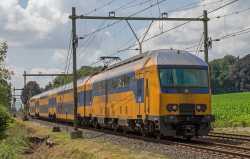>>2018023Ok I'll humour you one last time
>It is a significant consideration in examining the economics and cost:benefit ratio to implement electrification>[citation needed]>and diesel engines are perfectly efficient?More losses reduce the power available between substations. This requires either higher voltages to be used to lower the current and the losses (I^2R) or more feeder substations to be built. Both solutions are more costly. The alternative is having trains getting stranded after they lose power.
So any electrification on long stretches of railway, particularly in the USA where high power is also needed will be very expensive. Electrification on AC will put stress on the rest of the grid as going from 3 phase to single phase causes unequal load. DC has the problem of voltage conversion being difficult and the equipment to do so being expensive. Also, arcing is an issue. Quenching doesn't happen easily as there's always power. Whereas in AC, 0V is reached and naturally stops arcs if action is taken.
With Diesel you have none of these issues. They aren't perfect, sure, but there's no risk of voltage drop and stranding. Failures are often contained to a single locomotive (out of multiple), allowing the train to limp on to a point where the failed locomotive can be changed. As they are very standardised, railroads will often share locomotives (with usage fees added) and run the same ones from start to finish, then send them back with a return train. Try that in the EU and if you don't have on a multi-voltage locomotive (costing $$$) you'll end up frying it at some point.
>that proves very littleCorrect, but under US/Canadian conditions, similar solutions will be looked into. Especially in the western states/provinces.
>You can't make garbage calculations and say "the person with data is better than the person with none".Data allows you to disprove someone else. You are saying I'm wrong without providing reasons why.

